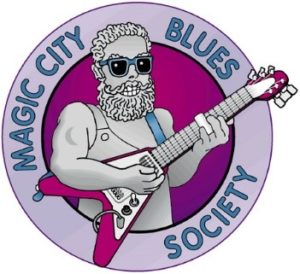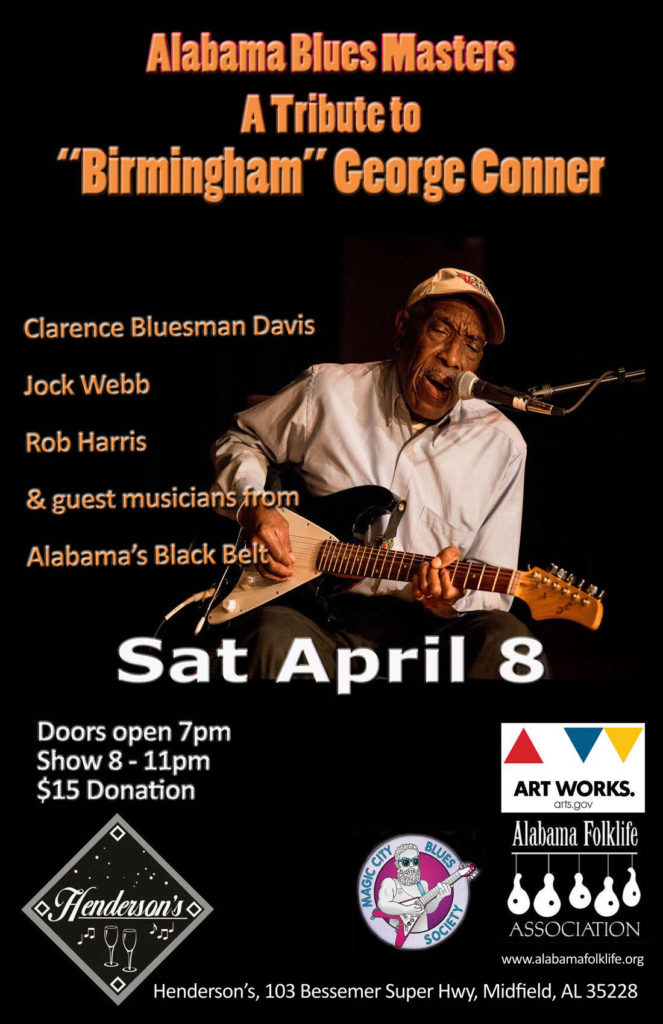Event Description
FOR IMMEDIATE RELEASE: February 27, 2017
Contacts for additional information:
Alabama Folklife Association – Mary Allison Haynie, alabamafolklife@att.net,
(205) 956-9888
Magic City Blues Society – Roger Stephenson, rjs44@charter.net, (205) 215-0616
Alabama Folklife Association and the Magic City Blues Society present
A Tribute to blues legend “Birmingham George” Conner
When: April 8, 2017 Doors open at 7pm Show starts at 8pm
Where: Henderson’s Lounge, 103 Bessemer Super Hwy., Midfield, AL 35228
Cost: suggested donation $10 in advance, $15 day of show.
Blues musicians from Birmingham and the Black Belt will gather at Henderson’s Lounge to play the late “Birmingham George” Conner’s original songs and his particular style of blues.
The late Willie King credited Birmingham George with teaching him how to play guitar as did many other Alabama musicians. Alabama’s black belt was named after the regions black fertile soil. There was a high African-American population who would entertain themselves playing music and singing. Sunday mornings would be church and gospel but the evenings could be similar music but in the juke joints with the words and tempo changed a little. With little mobility of the population the area developed a certain style of delta blues unique to the area. Birmingham George had that sound as did Willie King.
This tribute will try to recreate and celebrate that sound and honor. Guest musicians will include Clarence Blueman Davis, Jock Webb, Robert Harris, Ardie Dean and several more guests who still play the juke joints of the Black Belt.
Sponsors include: Birmingham Record Collectors Club, Birmingham Mountain Radio-The Lost Child, Living Blues Magazine, Music Maker Relief Foundation, Il Blues Magazine (Italy), Az-Blues (Italy).
More information on these websites:
musicmaker.org/artists/george-conner/
Bio
“Birmingham” George Conner was one of the fathers of the Chicago Blues, the author of songs performed by Howlin’ Wolf, B. B. King and others and the late Willie King’s guitar teacher.
He passed away at his home in Aliceville, Alabama, on December 18, 2016.
He was born May 25, 1934 on a farm near Aliceville. He was the third of 11 children. His father, Rev. Charlie Clay Conner was a farmer and freelance pastor who preached in different Baptist churches in the area. His mother, Emma Mae Conner, was a full-time mother. Charlie Conner was also an itinerant preacher and the churches of the area vied with each other to host him: The words of his sermons were so powerful and full of passion as were his voice and his guitar.
In an interview before his death “Birmingham” George said he grew up singing gospel and learned from his father to sing and play the guitar.
“I always loved gospel, but the blues was my music and at the time it was the music black people loved in this area,” he said.
As a young man, before becoming a pastor, Charlie Conner loved to sing and play the blues, so he didn’t get angry with his son who preferred to play the so-called devil’s music over gospel music.
The gospel music talks about the Lord, the blues sing about real life. In the old days if people did not sing about God, it meant they were singing about the other force: the devil.
“My father told me that if God wanted me to play the blues, that was what I needed to do. “Go and play,” he would say.”
Birmingham George started playing at the age of 13 in a small club in Aliceville and at house parties, or makeshifts clubs black people organized in their backyards, in their garages, or in their sitting rooms.
At the beginning of the Fifties, he left Aliceville to go to Chicago to achieve his dream to become a blues musician. He had heard many stories about the “Windy City”, about the music that filled the long and straight roads and the freedom black people could enjoy in that place many miles away for the segregated South. He was full of energy and eager for new experiences. Chicago seemed to him a magic place: in every corner, there were clubs where the blues were played. Those were the years of the first amplifiers and the electric guitars.
“In those years, Muddy Waters and Howlin’ Wolf played the electrified blues, they called it rhythm & blues, the music white people eventually called rock & roll,” he remembered.
In Chicago, musicians christened him “Birmingham” George, a nickname that followed him during his entire musical career.
“Nobody knew where Aliceville was and when people asked me where I came from, I would say Birmingham, the most known city in Alabama. This is how I became Birmingham George.”
Chicago is truly full of life and music, but far away from Alabama and his family, Birmingham George feels lonely. In the North life for black people was far from being easy.
“Segregation was a reality in Chicago as well. We could not mix with white people, or go into their bars. They could come to our clubs and listen to the blues and they did. They loved our music. I played in different white clubs, but I had to hide behind curtains, or in a room in the back of the stage. Things worked that way at the time.”
It was in this moment of his life that he composed words and music for the most beautiful blues song: Poor Boy, known also as Brother’s Tone.
“I’m just a poor boy, in this world alone. No, ain’t got nobody that I can call my own, that’s why I’m living in this world alone,” are some of the words of the song.
In 1965, he recorded, with the Chicago label Marsi, a 45 single of Poor Boy. Johnny Cameron is the producer, Otis Rush and Lonnie Brooks are the guitar players. In 1972, he recorded with the Atomic H label two 45s: Morning Love Blues and Too Hot to Hold. His surname is misspelled (“Corner” instead of “Conner”) and he never received copyright money.
“Birmingham George” was well-known in the Chicago of the time for a club, The Place, he opened in 1953 on 43th Street South. His friend Howlin’ Wolf, young Buddy Guy, B. B. King and many others frequented The Place.
“Howlin’ Wolf […] would come to my club with the guitar player Hubert Sumlin. I remember when they started playing together. Hubert was very young and Wolf would teach him some tricks. He loved him very much, indeed he loved him like a son. He protected him and sometimes he was quite strict with him, because he didn’t want him to get into trouble,” he said.
Birmingham George wrote the words and music of the well-known Howlin’ Wolf’s song How many more years are you gonna wreck my life. For this song also he never received copyright money.
“In the old days things worked differently. I would write a song and give it to a friend. Copyrights? What were they? People at the time didn’t thing about it. Music was our life and we divided everything with our friends, even the songs,” he explained.
Many musicians frequented The Club to learn Birmingham George’s original style of music, a style, he said, different than the Delta blues and people would come to listen to something new, or learn a new style.
In the summer, he often came back to Aliceville and people impatiently waited for his arrival to listen to his music and to learn how to play the guitar. Willie King was one of the students.
Birmingham George lived in Chicago for about 30 years. He left the city in the Eighties after he divorced his wife. He went to live in Memphis returning to the music of his childhood: gospel.
On Saturdays, he would play in the Beale Street clubs.
He came back to Aliceville in 1985 and not far from his childhood farm, opened The Blues Room, a juke joint that served as a gathering point for the Black Belt musicians, Willie King included.
After 15 years, The Blues Room had to shut its doors. One evening a jealous husband came into the club and shot his wife to death. It was a hard moment in Birmingham George’s life. Nevertheless, he continued playing the blues in different Alabama and Mississippi clubs and juke joints. He always was one of the artists playing at the Freedom Creek Festival and at Bettie’s Place, Willie King’s favorite juke joint.
In 1999, Birmingham George and Willie King recorded the CD Walkin’ the Walk Talkin’ the Talk.
In 2004, thanks to the nonprofit Music Maker, he recorded Brother’s Tone. Produced by Ardie Dean, the CD, because of economic reasons, came out only in 2013. There are eight magnificent tracks, seven of them written by Birmingham George. Jock Webb is on harmonica, Ardie Dean on drums and Gary Edmonds guitar.
“The blues is everything for me. I always played it when things were hard and when I was happy. It always helped me. This music helps to free your soul, because the blues is something that is hidden inside, something that needs to be let free. Is that kind of music you can play when you feel it inside you,” he said.
The Magic City Blues Society is a non-profit (501-C) organization founded on January 10, 1993. The purposes of the society are: (1) to encourage the performances of the Blues; (2) to encourage the preservation of the Blues; (3) to develop an appreciation of the Blues within the community; and (4) such other charitable civic, literary or cultural activities within the community consistent with the purposes stated above. The Blues is very much a part of Southern life and history, deserving recognition as a valid and historical folk art form.

